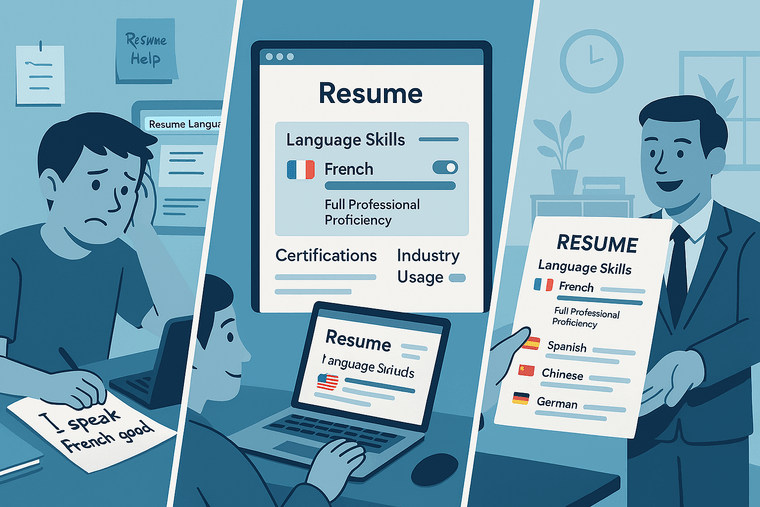
Resume Language Skills: How to Describe and List Language Proficiency Levels on Resume

In a globalized world, where organizations often operate in multiple countries, language skills have become an invaluable asset for job seekers. Including your language proficiency levels on your resume can help set you apart from other candidates, showcasing your ability to communicate effectively in diverse environments.
In this article, we will discuss how to describe and list language proficiency levels on your resume, when to include them, and some mistakes to avoid.

How to Describe Language Proficiency Levels on a Resume
When describing your language proficiency levels on a resume, it's important to use standardized terminology to convey your abilities accurately. The most common scale used is the Interagency Language Roundtable (ILR) scale, which categorizes language skills into five levels:
Elementary Proficiency (ILR Level 1)
At this level, you can understand and use basic phrases and expressions related to common, everyday situations. You can introduce yourself and others, ask and answer simple questions, and engage in brief conversations on familiar topics. However, your vocabulary is limited, and you may struggle with more complex grammar and sentence structures.
Limited Working Proficiency (ILR Level 2)
With limited working proficiency, you can understand and communicate in routine social and work situations. You can discuss your background, education, and work experience, as well as describe and compare objects, people, and places. While you may still make grammatical errors and have difficulty understanding complex or idiomatic language, you can generally handle tasks related to travel, shopping, and daily life.
Professional Working Proficiency (ILR Level 3)
At this level, you can understand and communicate effectively in most professional and social situations. You can participate in extended conversations, discuss abstract or complex topics, and provide detailed explanations. While you may still have a foreign accent or make occasional errors, you can generally comprehend spoken and written language in various contexts and interact with native speakers without significant difficulty.
Full Professional Proficiency (ILR Level 4)
With full professional proficiency, you can understand and use the language fluently and accurately in virtually all professional and social contexts, including specialized and technical subjects. You can comprehend idiomatic expressions, slang, and cultural references, as well as produce written and spoken language that is well-organized, coherent, and stylistically appropriate. At this level, your language skills are equivalent to those of a highly-educated native speaker.
Native or Bilingual Proficiency (ILR Level 5)
This level indicates that you have native-like fluency and can understand, speak, read, and write the language with complete ease. You have a deep understanding of cultural nuances, idiomatic expressions, and regional dialects, and you can communicate effectively in both formal and informal situations. Bilingual proficiency means that you have native-like fluency in two languages.
Should You List Language Skills on a Resume?
Including language skills on your resume can be advantageous in several situations, as they can set you apart from other candidates and demonstrate your ability to communicate effectively in diverse environments. Here are some scenarios when it's a good idea to list language skills on your resume:
- When the job posting specifically mentions a required language
In this case, highlighting your language proficiency can directly contribute to meeting the job requirements, significantly increasing your overall chances of being considered for the vacant position. 2. When applying to a company that operates in multiple countries Companies with a global presence often value employees who can communicate with clients or colleagues from different backgrounds. By showcasing your language skills, you demonstrate your ability to adapt and contribute to an international work environment. 3. When your language skills complement your other skills For example, if you're a customer support specialist who is fluent in a language spoken by a significant portion of the company's clients, your language skills may improve customer satisfaction and retention.

When Not to Include Language Skills on a Resume
While language skills can be an asset, there are a couple of instances when including them on your resume may not actually be beneficial or necessary:
- When your language proficiency is at a very basic level
If your language skills are limited to basic greetings and phrases, they may not be valuable enough to include on your resume. Employers are typically more interested in candidates with a functional level of proficiency that can be utilized in a professional setting. 2. When the job posting does not mention any language requirements In this case, listing your language skills may not add significant value to your resume. Focus on emphasizing your relevant skills, experience, and accomplishments instead.
Where to List Language Proficiency Levels on Resume
The placement of your language proficiency levels on your resume typically depends on its format and layout. Some of the most common locations include:
Skills Section
Including your language proficiency levels alongside other relevant skills can help create a comprehensive overview of your abilities. This approach is particularly suitable for functional or combination resume formats that emphasize skills over chronological work history.
Additional Information Section
Creating a separate section at the end of your resume to list your language proficiency levels can be an effective way to highlight your language skills without detracting from your core qualifications. This approach works well for chronological resume formats.
Education Section
If you have formal language training or certifications (e.g., a degree in a foreign language or a recognized language examination certificate), you can include your proficiency levels in the Education section of your resume. This approach can help demonstrate your commitment to learning and mastering a language.
How to List Language Certifications on Your Resume
Why Language Certifications Matter
Certifications like TOEFL, IELTS, DELE, or DALF provide formal proof of your language proficiency. Adding these certifications builds credibility and assures recruiters of your skill level.
Where to Place Language Certifications
- Include them in the Skills or Certifications section of your resume.
- For highly relevant certifications, highlight them in your resume summary.
Example:
- Spanish (DELE C1 Certified) – Professional proficiency validated through formal assessment.
- English (TOEFL Score: 110/120) – Demonstrates advanced fluency for professional settings.
How to Highlight Industry-Specific Language Skills
Why It’s Important
Different industries require language proficiency for specific tasks. Highlighting role-specific language usage tailors your resume to job requirements.
Examples for Common Roles
- Sales and Business Development: “Fluent in German – Supported client acquisition and B2B negotiations in European markets.”
- Customer Support: “Bilingual in English and Spanish – Delivered efficient technical support for Latin American customers.”
- Translation Roles: “Native Japanese speaker with professional translation experience in legal documents.”
How to Use Alternative Language Proficiency Scales
Why Include Multiple Frameworks
While the ILR scale is popular, frameworks like CEFR and ACTFL are widely recognized globally. Including these ensures clarity for international recruiters.
Common Proficiency Scales
- ILR (Interagency Language Roundtable): Native to Elementary levels (0–5).
- CEFR (Common European Framework of Reference): Levels A1 to C2.
- ACTFL (American Council on the Teaching of Foreign Languages): Novice to Distinguished levels.
Example:
- French (CEFR Level C1) – Advanced proficiency suitable for professional and academic settings.
- Italian (ACTFL Advanced High) – Demonstrates near-native speaking ability.
How Language Skills Enhance Global Collaboration
Why Global Language Skills Matter
In today’s globalized workplace, multilingual abilities help teams collaborate across borders, increasing productivity and efficiency.
Example Scenarios
- Remote Work: “Fluent in Mandarin – Facilitated project coordination with teams across APAC regions.”
- Global Teams: “Proficient in Spanish – Supported communication for cross-border marketing campaigns.”
- Cultural Adaptability: “Bilingual in Arabic and English – Strengthened client relationships in MENA markets.”
How to Link Language Skills to Soft Skills
Why This Connection Matters
Language proficiency often enhances soft skills like communication, cultural awareness, and negotiation. Demonstrating this link makes your resume more impactful.
Example Statements
- Cultural Adaptability: “Bilingual in French and English – Adapted seamlessly to multi-cultural team environments.”
- Negotiation Skills: “Used German fluency to close negotiations with European partners, securing a 10% revenue increase.”
- Communication Skills: “Presented technical solutions fluently in Portuguese to clients in South America.”
How to Include Tools That Help Develop Language Skills
Why Tools Matter
Mentioning tools like Duolingo, Babbel, or Rosetta Stone shows your commitment to improving language proficiency, especially if self-learning.
Tools to Mention
- Duolingo: For structured daily practice and fluency improvement.
- Rosetta Stone: For immersive language learning tailored to professional needs.
- Babbel: For conversational and industry-specific vocabulary training.
Example:
- “Improved Italian proficiency (CEFR B2) using Duolingo and conversation practice over six months.”
Where to Place Language Proficiency Levels on a Resume
Why Placement Matters
The location of your language skills depends on their relevance to the role. Proper placement ensures recruiters notice them.
Placement Options
- Skills Section: Best for general language proficiencies (e.g., “Fluent in Spanish”).
- Certifications Section: For formal certifications like TOEFL or CEFR.
- Resume Summary: Highlight language skills for multilingual or international roles.
Example:
Resume Summary “Bilingual in Mandarin and English with 5+ years’ experience leading remote teams across APAC markets.”
How to Tailor Language Proficiency for Job Requirements
Why Tailoring Matters
Recruiters prioritize language skills based on the role. Tailoring your resume ensures you match the job’s language expectations.
Steps to Tailor Language Skills
- Analyze the Job Description: Identify required languages and proficiency levels.
- Prioritize Relevant Languages: List the most relevant languages first.
- Add Context: Show how your proficiency supports job functions.
Example:
- “Fluent in Japanese (Full Professional Proficiency) – Enabled client relations for a Tokyo-based business expansion.”
Certifications to Validate Language Proficiency
Why Language Certifications Matter
Language certifications provide formal validation of proficiency levels, making your claims credible to recruiters, especially for international roles.
Examples of Language Certifications to Include
- TOEFL (Test of English as a Foreign Language): Measures English fluency for academic or professional settings.
- IELTS (International English Language Testing System): Assesses English proficiency across listening, reading, writing, and speaking.
- DELE (Diplomas of Spanish as a Foreign Language): Certification for Spanish fluency at various CEFR levels.
- DALF/DELF (Diplomas in French Language Studies): Recognizes French proficiency levels from beginner to advanced.
- JLPT (Japanese-Language Proficiency Test): Validates Japanese language skills across levels N1 to N5.
How to Add Language Certifications to Your Resume
Place certifications in the Skills or Certifications section for clarity.
Example:
- “English – TOEFL Score: 115/120 (Advanced Professional Proficiency).”
- “Spanish – DELE C1 Certified (Full Professional Proficiency).”
Tailoring Language Proficiency for Industry-Specific Roles
Why Industry Context Matters
Different industries use language skills uniquely. Tailoring your proficiency to specific roles helps recruiters understand how your skills align with their needs.
Examples of Role-Based Applications
-
Customer Support and Service
- “Fluent in Spanish – Resolved 90% of customer support tickets for LATAM clients, improving customer satisfaction scores by 20%.”
-
Sales and Business Development
- “Professional proficiency in German – Facilitated negotiations with European clients, driving $500K in new business.”
-
Translation and Localization
- “Native Japanese speaker – Translated technical manuals, achieving 100% accuracy across engineering projects.”
-
International Teaching and Training
- “Advanced French proficiency – Delivered corporate training sessions for French-speaking teams in West Africa.”
Alternative Proficiency Scales for Global Relevance
Why Use Multiple Proficiency Frameworks?
Recruiters and organizations worldwide use various frameworks to evaluate language skills. Including familiar scales like CEFR, ILR, or ACTFL ensures clarity and global relevance.
Common Language Proficiency Scales
- CEFR (Common European Framework of Reference for Languages): A1 (Beginner) to C2 (Native-like Proficiency).
- ILR (Interagency Language Roundtable): 0 (No Proficiency) to 5 (Native Proficiency).
- ACTFL (American Council on the Teaching of Foreign Languages): Novice, Intermediate, Advanced, Superior, Distinguished.
Example:
- “French – CEFR Level C1 (Advanced Professional Proficiency).”
- “Mandarin – ILR Level 3 (Working Proficiency).”
How Language Proficiency Reinforces Soft Skills
Why This Connection Matters
Your ability to communicate in multiple languages often translates into valuable soft skills, such as cultural adaptability, effective negotiation, and teamwork.
Examples of Soft Skills Enhanced by Language Proficiency
-
Cultural Adaptability
- “Worked with cross-border teams in Germany and China, using fluent German and Mandarin to align cultural and business expectations.”
-
Negotiation Skills
- “Negotiated long-term contracts with French-speaking clients, securing a 15% revenue increase.”
-
Team Collaboration
- “Facilitated communication across a multilingual engineering team, bridging language gaps and improving project outcomes.”
Highlighting Language Skills for Remote and Global Teams
Why It Matters for Modern Workplaces
In a globalized world, language proficiency is key for remote communication and international project coordination. Highlight how your multilingual abilities improve team productivity and cross-border collaborations.
Examples of Global Work Applications
- “Collaborated with remote development teams across LATAM and Europe, ensuring project success using fluent Spanish and English.”
- “Coordinated weekly strategy meetings in Mandarin with APAC stakeholders, reducing miscommunication by 30%.”
Tools That Support Language Proficiency in Global Teams
- Slack, Microsoft Teams, and Zoom for multilingual collaboration.
- Real-time translation tools (e.g., Google Translate, DeepL) for efficiency.
Continuous Improvement in Language Skills
Why Growth Matters
Show recruiters your dedication to improving language proficiency through courses, tools, or immersive practice. This reflects commitment and adaptability.
Tools and Methods to Highlight:
- Language Learning Apps: Duolingo, Babbel, Rosetta Stone.
- Courses: Online or university-based language programs.
- Conversational Practice: Tandem language partners or language immersion programs.
Example:
- “Improved Italian proficiency from CEFR B1 to B2 using Duolingo and weekly conversation practice over six months.”
- “Currently pursuing JLPT N2 certification to further enhance Japanese fluency.”
Where to Place Language Skills on Different Resume Types
Why Placement Matters
Strategic placement of language skills ensures visibility, depending on the resume format and job role.
Resume Formats and Placement:
-
Chronological Resumes
- Include language skills in the Skills section or within job descriptions.
- Example: “Managed client presentations in fluent Spanish, contributing to $100K deal closures.”
-
Functional Resumes
- Highlight language skills in a dedicated Core Competencies or Skills section.
- Example: “Languages: English (Native), French (C1), Japanese (N2).”
-
Targeted Resumes
- Tailor language placement to align with job descriptions.
- Example: “Professional fluency in German – Essential for EMEA market expansion strategy.”
Quantifying the Impact of Language Proficiency
Why Metrics Matter
Quantifying the results of your language skills demonstrates real-world value, making your resume more impactful.
Examples of Measurable Outcomes
-
Customer Satisfaction
- “Resolved 95% of multilingual customer inquiries in Spanish, increasing satisfaction scores by 20%.”
-
Revenue Growth
- “Facilitated client negotiations in French, contributing to a $500K revenue boost in the European market.”
-
Efficiency Gains
- “Reduced communication delays in global projects by 15% through fluent Mandarin.”

Common Mistakes to Avoid While Listing Language Skills on Resume
To ensure that your resume accurately and effectively showcases your language skills, you should avoid these common mistakes:
Overstating Your Language Proficiency
Be honest about your abilities to avoid any potential issues in the future. Exaggerating your language skills may lead to misunderstandings or even jeopardize your credibility if your language abilities are tested during an interview or on the job.
Using Ambiguous Terminology
Stick to standardized terminology, such as the ILR scale or the Common European Framework of Reference for Languages (CEFR), to ensure clarity and avoid confusion. Non-standard terms like "intermediate" or "advanced" can be vague and may not accurately convey your proficiency level.
Listing Irrelevant Languages
Only include languages relevant to the position or industry. Including too many languages or languages that have no bearing on the job can make your resume appear unfocused or cluttered. Instead, prioritize languages that are directly related to the position or demonstrate your ability to work in a diverse, global environment.
Proficient vs Fluent on Resume
"Proficient" and "fluent" are often used interchangeably on resumes, but they represent different levels of language proficiency. In the context of the ILR scale, "proficient" typically refers to Professional Working Proficiency (ILR Level 3), while "fluent" corresponds to Full Professional Proficiency (ILR Level 4). Ensure you accurately represent your language skills by using the appropriate term for your proficiency level.
Conversational vs Fluent on Resume
"Conversational" is another term frequently used on resumes to describe language proficiency. It generally indicates a level of language skill that allows for casual communication, falling between Limited Working Proficiency (ILR Level 2) and Professional Working Proficiency (ILR Level 3). If you choose to use "conversational" on your resume, make sure it accurately reflects your language abilities and the requirements of the position.
How to Determine Your Language Proficiency Level for Resume
If you want to accurately determine your language proficiency level, then you should consider each of the following factors: Formal training and education: Reflect on your language courses and certifications, as they can provide a benchmark for your proficiency level. Professional experience: If you have used a language in a professional setting, evaluate the complexity of the tasks and the level of communication required. Self-assessment: Be honest with yourself when evaluating your reading, writing, speaking, and listening abilities in a given language. Use the ILR scale descriptions as a guide to determine your level of proficiency.
Key Takeaways
Including language proficiency levels on your resume can be a valuable addition when applying for positions that require or prefer multilingual candidates. By using standardized terminology, accurately assessing your proficiency, and strategically placing this information on your resume, you can effectively showcase your language skills and increase your chances of landing the job.
- How to Describe Language Proficiency Levels on a Resume
- Should You List Language Skills on a Resume?
- Where to List Language Proficiency Levels on Resume
- How to List Language Certifications on Your Resume
- How to Highlight Industry-Specific Language Skills
- How to Use Alternative Language Proficiency Scales
- How Language Skills Enhance Global Collaboration
- How to Link Language Skills to Soft Skills
- How to Include Tools That Help Develop Language Skills
- Where to Place Language Proficiency Levels on a Resume
- How to Tailor Language Proficiency for Job Requirements
- Certifications to Validate Language Proficiency
- Tailoring Language Proficiency for Industry-Specific Roles
- Alternative Proficiency Scales for Global Relevance
- How Language Proficiency Reinforces Soft Skills
- Highlighting Language Skills for Remote and Global Teams
- Continuous Improvement in Language Skills
- Where to Place Language Skills on Different Resume Types
- Quantifying the Impact of Language Proficiency
- Common Mistakes to Avoid While Listing Language Skills on Resume
- Proficient vs Fluent on Resume
- Conversational vs Fluent on Resume
- How to Determine Your Language Proficiency Level for Resume
- Key Takeaways

Written By
Maggie Horne
Content Manager & Resume Expert
Maggie is the Content Manager at VisualCV, with years of experience creating easy-to-understand resume guides, blogs, and career marketing content. Now, she loves helping people learn how to leverage their skills to start their dream jobs.

The top hiring and human resource statistics for 2025, including data on AI resumes, job interviews, remote work, and recruiting.
January 1, 2025
Read Post

Community Success Manager & CV Writing Expert
![How to write a resume summary [with 10+ examples]](/static/c59086bef6a2d0a37e3fbb59dba7202d/61ca5/taking-notes-at-computer.jpg)
A strong resume summary is key to standing out with hiring managers and recruiters. Use these 10 resume summary examples to create your own!
December 16, 2021
Read Post

VP Marketing & Resume Expert

Learning how to write a resume in 2025 is an important step in everyone's career. This step-by-step guide with resume examples will help you get started.
February 7, 2025
Read Post

Community Success Manager & CV Writing Expert
Copyright ©2025 Workstory Inc.